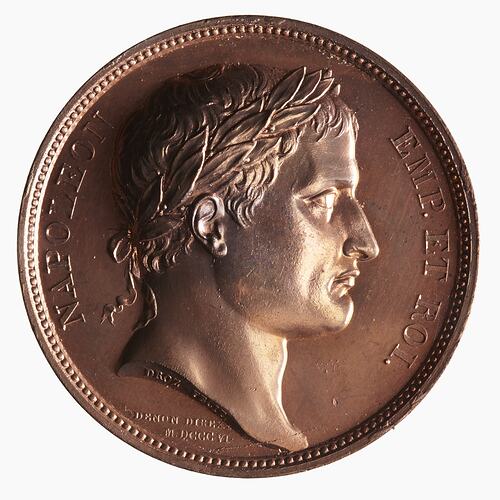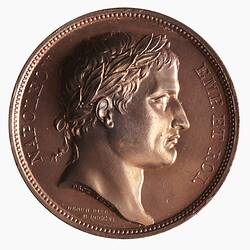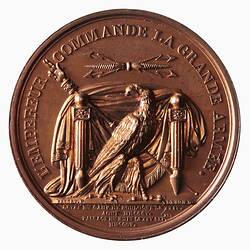Summary
Medal Levee du Camp de Boulogne, 'Camp at Boulogne Raised', Issued by France, 1805
Artist: Jean Pierre Droz and Nicholas Guy Antoine Brenet
Minted by Paris Mint
Obverse Description
Laureate head of Napoleon facing right, around, NAPOLEON EMP. ET ROI.; on neck truncation in small lettering, DROZ FECIT.; in field below, DENON DIREXI / M.DCCC.VI.
Reverse Description
Grand chair of state, over which lies the imperial robe; the French eagle stands in the front, and the sceptre of royalty reclines on the arm of the chair; above, the forked thunderbolt of Jove; around, L'EMPEREUR COMMANDE LA GRANDE ARMEE.; in exergue, LEVEE DU CAMP DE BOULOGNE LE XXIV. / AQUT MDCCCV. / PASSAGE DU RHIN LE XXV SEPERE. / MDCCCV; on exergue line, BRENET.F DENON D.
Edge Description
Plain
Significance
"Napoleon, after the grand exhibition at Boulogne, which the medal, No. XXXV, commemorates, found it necessary to transfer the camps from the sea to the banks of the Rhine, the Inn, and the Danube, and the camp of the grand army, designated of England, consisting of above 200,000 men, which were to be transported over to England in one night, by means of a flotilla of 1500 vessels, escorted by sixty ships of the line, were now destined to other quarters; on the 4th of August, orders were issued for the camp to break up ; and on the 25th of September following, they passed the Rhine in six divisions, rapidly advancing towards the scene of action. On the 30th of September, the park of artillery passed the Rhine at Khel, and advanced towards Heilbrun. The main body being on the German side of the Rhine, Napoleon issued a proclamation to the troops, in which he says that the Austrians have passed the Inn, and driven his ally from his capital: that they have passed the Rhine, and will not again make peace without a sufficient guarantee. Their Emperor is in the midst of them, they are only the advanced guard of a great people, who, if it were necessary, would all rise at his voice to dissolve this new league; they have much to do, but they will take no rest till they have planted their eagles on the territories of their enemies.
In a note of Talleyrand to the Count Cobentzel, he says that his Majesty hoped that Austria would observe the strictest neutrality; but that the movements of troops, and other hostile dispositions, make him demand a speedy explanation. He is compelled to postpone his projects against England; and thus Austria had made a great diversion in favour of that kingdom." Laskey p. 93-94
Note: Originally this issue seems to have been produced with the obverse die by Droz (see NU 34214l). However that die cracked (see NU 34215l) and was replaced by an obverse by Andrieu (as this medal) which was the medal described by Laskey.
More Information
-
Collection Names
-
Collecting Areas
-
Acquisition Information
Transfer from National Gallery of Victoria (NGV), 15 Mar 1976
-
Date Issued
1805 AD
-
Issued By
-
Artist
-
Artist
-
Series
-
Material
Bronze
-
Axis
12
-
Classification
-
Category
-
Discipline
-
Type of item
-
Dimensions
41 mm (Outside Diameter), 37.9 g (Weight)
-
Shape
Round
-
References
Laskey LIV with Andrieu obverse
[Book] Laskey, J. C. Medals Struck at the National Medal Mint by Order of Napoleon Bonaparte., 93-94 Pages
-
Keywords


